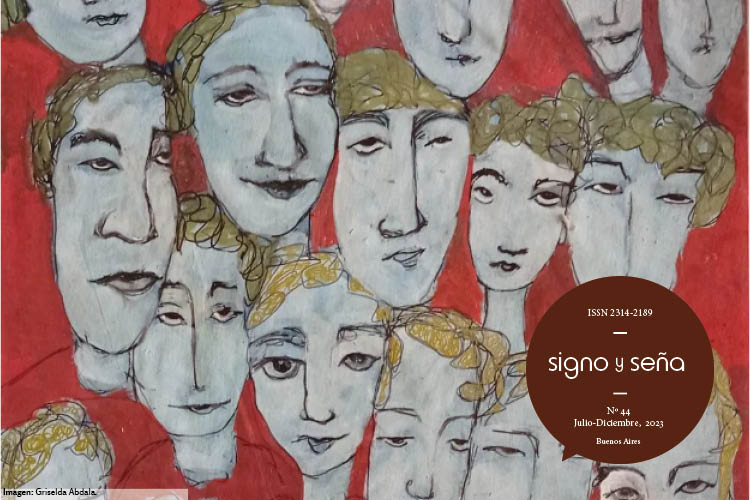Tell me what you laugh at, and I'll tell you who you are
Hypermedia Humor in the processes of collective identification
Keywords:
hypermediatic humor, identity collectives, social networks, hypermediatization, identification
Abstract
The aim of this article is to describe two procedures of Hypermedia Humor in the generation and daily activation of identity collectives. We call Hypermedia Humor the laughable produced in the interaction between mass media and Internet and telephone-based media (Fraticelli, 2023). The paper starts from the semiotic approach of Veron's (2013, 2012, 1997, 1994, 1987b) concept of identity collective and his periodization of the link between the conformation of collectives and mediatization. Then, we focus on the changes brought by the new media system to the generation of collectives, among which is the action of Hypermedia Humor. From it, we concentrate on two basic procedures of everyday life: the production of laughable publications in the networks and the regulation of their circulation. Both generate membership in identification collectives. We describe the ways in which they operate by analyzing two cases. The first is the production of hypermediatized political humor of the first speech at the opening of the legislative sessions of President Alberto Fernández and the debate in the Senate on the Law on the Voluntary Interruption of Pregnancy. And the second is the regulation of the laughable generation of the former president of ArteBA, Juan Lynch, in which different hypermedia enunciators from the art world and the media took part.Downloads
Download data is not yet available.
References
Fraticelli, Damián. 2023. El Humor Hipermediático. Una nueva era de la mediatización reidera. Buenos Aires: Teseo. Fecha de consulta, 23 de mayo de 2023.
https://www.editorialteseo.com/archivos/30396/el-humor-hipermediatico/
Verón, Eliseo. 2013. La semiosis social, 2. Ideas, momentos, interpretantes. Buenos Aries: Paidós.
Verón, Eliseo. 2011. “El canto de las sirenas”. En Papeles en el tiempo: 74-76. Buenos Aires: Paidós.
Verón, Eliseo. 2012. “Mediatización de la política: estrategias, actores y construcción de colectivos”. En, A. Mercier (coord.) La comunicación política. Buenos Aires: La Crujía.
Verón, Eliseo. 1997. “Esquema para el análisis de la mediatización”. Diálogos de la Comunicación 48: 9-17.
Verón, Eliseo. 1994. “Mediatización, comunicación política y mutaciones de la democracia”. Semiosfera 2: 5-36.
Verón, E. (1987b). “La palabra adversativa. Observaciones sobre la enunciación política”. En Arfuch, L. et al., El discurso político. Lenguajes y acontecimientos: 19-26). Buenos Aires: Hachette.
https://www.editorialteseo.com/archivos/30396/el-humor-hipermediatico/
Verón, Eliseo. 2013. La semiosis social, 2. Ideas, momentos, interpretantes. Buenos Aries: Paidós.
Verón, Eliseo. 2011. “El canto de las sirenas”. En Papeles en el tiempo: 74-76. Buenos Aires: Paidós.
Verón, Eliseo. 2012. “Mediatización de la política: estrategias, actores y construcción de colectivos”. En, A. Mercier (coord.) La comunicación política. Buenos Aires: La Crujía.
Verón, Eliseo. 1997. “Esquema para el análisis de la mediatización”. Diálogos de la Comunicación 48: 9-17.
Verón, Eliseo. 1994. “Mediatización, comunicación política y mutaciones de la democracia”. Semiosfera 2: 5-36.
Verón, E. (1987b). “La palabra adversativa. Observaciones sobre la enunciación política”. En Arfuch, L. et al., El discurso político. Lenguajes y acontecimientos: 19-26). Buenos Aires: Hachette.
Published
2023-12-26
How to Cite
Fraticelli, D. (2023). Tell me what you laugh at, and I’ll tell you who you are. Signo & Seña, (44). https://doi.org/10.34096/sys.n44.12920
Issue
Section
Dossier
- Authors keep the copyright and give the journal the right of the first publication, with the work registered with the Creative Commons Attribution-ShareAlike 4.0 International License, which allows third parties to use what is published whenever they mention the authorship of the work and the first publication in this magazine.
- Authors can make other independent and additional contractual agreements for the non-exclusive distribution of the article published in this journal (eg, include it in an institutional repository or publish it in a book) as long as they clearly indicate that the work It was published for the first time in this magazine.
- Authors are allowed and recommended to publish their work on the Internet (for example on institutional or personal pages).

















